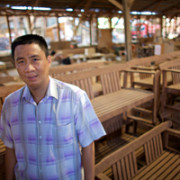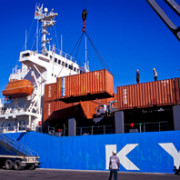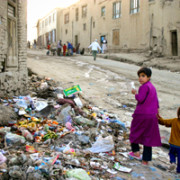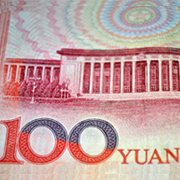Governance and public sector management
 Industry and trade
Industry and trade
 Social development and protection
Social development and protection
 Industry and trade
Industry and trade
 Environment
Environment
 Regional cooperation and integration
Regional cooperation and integration
 Environment
Environment
 Finance sector development
Finance sector development
 Industry and trade
Industry and trade
 Finance sector development
Finance sector development

Better urban management in the Pacific offers double dividends

A new report by Asian Development Bank (ADB), Moving from Risk to Resilience: Sustainable Urban Development in the Pacific, argues that efforts to improve urban management in the Pacific can improve both the quality of life in the region’s cities and towns and, at the same time, build greater resilience to natural hazards and climate change-induced events.
Is finance a binding constraint for SME participation in trade in Asia?

Small and medium-sized enterprises (SMEs) are a very important part of Asia’s economy. In this article, we explore SMEs and their financing issues with respect to the performance of SMEs in international trade, based on the sample of more than 8,000 companies across the People’s Republic of China (PRC) and Association of Southeast Asian Nations (ASEAN) member states. The discussion is derived from a recent Asian Development Bank Institute (ADBI) working paper (Jinjarak, Mutuc, and Wignaraja 2014).
Giving Asia’s elderly care and dignity

There is a seemingly hidden problem for Asia in providing economic, social and emotional security for the elderly. But drawing on the experiences of more developed economies, I think there is a silver lining behind this—an opportunity if actions are taken now to provide care and to give dignity to the elderly in Asia.
The new mega-regionals: the TPP, RCEP and beyond

The world may be on the verge of renewing the global trading system with huge “mega-regional” negotiations on the trade rules of the 21st century. These negotiations include the Regional Comprehensive Economic Partnership (RCEP), the Trans Pacific Partnership (TPP), and the Transatlantic Trade and Investment Partnership (TTIP); the countries involved cover nearly 80% of global GDP. The hope is that these approaches will overcome constraints that have held up progress in the World Trade Organization (WTO).
The food, water, energy nexus

Striking rates of economic growth notwithstanding, 550 million people remain hungry in the Asia and Pacific region, 65% of the population has no safe piped water, and more than 600 million people live without electricity. Overcoming these problems requires a combined approach in which food, water and energy are treated as a nexus, rather than as separate, standalone issues, which has too often been the case in the past.
Pacific economies: Leveraging the benefits of East Asian and Southeast Asian growth

With the center of global economic activity shifting rapidly from the United States and Europe toward Asia, opportunities are being generated for the Pacific developing member countries (DMCs) of the Asian Development Bank (ADB) to benefit from increasing economic interdependence with Asia. Economic transmission channels are (i) trade in goods; (ii) trade in services, in particular tourism; (iii) finance and foreign direct investment; (iv) labor and remittance flows; and (v) aid.
Green cities: Changing the culture of waste

Asia’s drive to urbanize is taking an increasing toll on the environment with growing mountains of solid waste as city dwellers consume and discard resources at an ever increasing rate. If “green” cities are to be the answer to these environmental stresses then they will need to develop much more effective programs to reduce, reuse, recycle and recover waste.
What to look out for in Asian bond markets in 2014

2014 is shaping up to be another challenging year for bond markets in Asia after a see-saw 2013 which saw prices rise at the start of the year, and then fall back on news that the US Federal Reserve plans to reduce or ‘taper’ its quantitative easing operations.
Use of national currencies for trade settlement in East Asia: A proposal

Financial cooperation and integration in East Asia has been languishing for almost a decade. But ASEAN, the People’s Republic of China (PRC), Japan, and the Republic of Korea (henceforth, Korea), or ASEAN+3, have been more successful in promoting free trade in East Asia by establishing a number of bilateral and plurilateral free trade agreements (FTAs) with countries in the region and outside the region.
E-commerce in Asia brings international price arbitrage opportunities

Cross-border e-commerce is booming in the Asia and Pacific region. And exchange rate fluctuations play a key role in these transactions. In their quest for the best deals, consumers in the region are taking advantage of exchange rate movements, and shop abroad whenever the exchange rate is favorable. Our research proves that short-term international price arbitrage is occurring—an important finding for monetary policy and the private sector.


Search
Subscribe / Connect to Asia Pathways
Subjects
- Accelerating Progress in Gender Equality
- Addressing Remaining Poverty and Reducing Inequality
- Agriculture and natural resources
- Capacity development
- Climate change
- Economics
- Education
- Energy
- Environment
- Finance and Innovation
- Finance sector development
- Gender
- Globalization and Economic Stability
- Governance and public sector management
- Health
- Industry and trade
- Information and Communications Technology
- Infrastructure
- Making Cities More Livable
- Miscellaneous
- Population
- Poverty
- Private sector development
- Regional cooperation and integration
- Sanitation
- Social development and protection
- Strengthening Governance and Institutional Capacity
- Subjects
- Transport
- Uncategorized
- Urban development
- Video Blog
- Water
Recent Posts
- From Crisis to Resilience: The Evolution of the Banking Sector in Asia and the Pacific
- Tariffs on the Table: What Could Be Asia’s Next Move?
- Investing in Childcare a Win for Women and the Economy
- Flush and Flourish: Upgraded Toilets Can Transform Lives in Rural Asia
- New Ways for Climate Finance and Development in Asia and the Pacific




Recent Comments